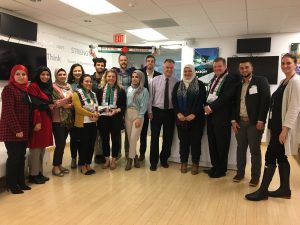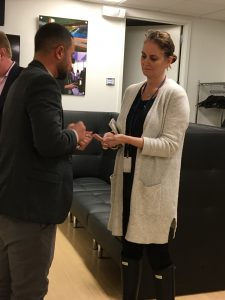Global S&T Development Trend Analysis Platform of Resources and Environment
| WEF Hosts Water Professionals from Palestine | |
| admin | |
| 2019-11-27 | |
| 发布年 | 2019 |
| 语种 | 英语 |
| 国家 | 国际 |
| 领域 | 资源环境 |
| 正文(英文) | On Nov. 5, the Water Environment Federation (WEF; Alexandria, Va.) welcomed an international delegation from Palestine to discuss the current status and future of water in the West Bank region, which is bordered by the countries of Jordan and Israel. The meeting with the group of seven delegates focused on how international cooperation can help water professionals navigate such issues as loss and leakage, resource security, unbalanced regulations, and workforce shortages. International visits such as this one help WEF to achieve its mission of connecting and enriching the expertise of water professionals. Focusing on Regulations to Improve ConservationRoa Taweel, Director of the Engineering Department for the West Bank city of Al-Bireh, shared the delegations concerns about losing drinking water during distribution. She noted the municipality loses about 35% of its water to leakage.  Water Environment Federation (WEF; Alexandria, Va.) staff members stand alongside Palestinian water-sector delegates during an international meeting at WEF headquarters on Nov. 5. Photo courtesy of Mariah Walters Orose/WEF. “We need to improve the situation,” she said. WEF Senior Director of Government Affairs and Strategic Partnerships Claudio Ternieden said Palestine’s water loss is not unique or insurmountable. “We’ve seen leakages of 65% in other parts of the world,” he said. Saja Younes, a Water and Environment Engineer with the City of Nablus, described her hope to revise regulatory standards and change restrictive policies surrounding biosolids use. “Regulations such as moisture content: Our standard use for sludge is with a moisture content at 28%,” she said. “How can I convince the state to change? What can I do?” Dewatering biosolids to a suitable level for pathogen elimination usually requires moisture contents around 10% or lower. Ternieden related that the U.S. water sector faces similar regulatory and standardization challenges. “We have been trying to change certain regulations that [determine] whether biosolids can be used for other products and not be seen as waste,” he said. Reviewing Resource Recovery Omar Abuawwad, Civil-Strategic Planning Engineer for the Palestinian Water Authority, offers a gift to Laila Sukkariyyah, WEF Director of Global Programs. Photo courtesy of Walters-Orose/WEF. The delegation also heard about U.S. efforts to change perception of the water sector with a focus on resource recovery. Patrick Dube, WEF Technical Programs Manager, noted that changing terminology used to discuss these issues can make a major difference. “We don’t call [them] ‘wastewater treatment facilities;’ we call them ‘water resource recovery facilities,’” he said. “We take a holistic approach to everything: water, nutrients, biosolids.” Dube outlined a project WEF began last year to create a baseline for resource recovery at water resource recovery facilities across the U.S. by surveying utilities. Through this project, titled ReNEW, WEF will continue to survey utilities every 2 years to begin measuring changes to resource recovery. — Mariah Walters Orose, WEF Highlights |
| URL | 查看原文 |
| 来源平台 | Water Environment Federation |
| 文献类型 | 新闻 |
| 条目标识符 | http://119.78.100.173/C666/handle/2XK7JSWQ/216123 |
| 专题 | 资源环境科学 |
| 推荐引用方式 GB/T 7714 | admin. WEF Hosts Water Professionals from Palestine. 2019. |
| 条目包含的文件 | 条目无相关文件。 | |||||
| 个性服务 |
| 推荐该条目 |
| 保存到收藏夹 |
| 查看访问统计 |
| 导出为Endnote文件 |
| 谷歌学术 |
| 谷歌学术中相似的文章 |
| [admin]的文章 |
| 百度学术 |
| 百度学术中相似的文章 |
| [admin]的文章 |
| 必应学术 |
| 必应学术中相似的文章 |
| [admin]的文章 |
| 相关权益政策 |
| 暂无数据 |
| 收藏/分享 |
除非特别说明,本系统中所有内容都受版权保护,并保留所有权利。
修改评论